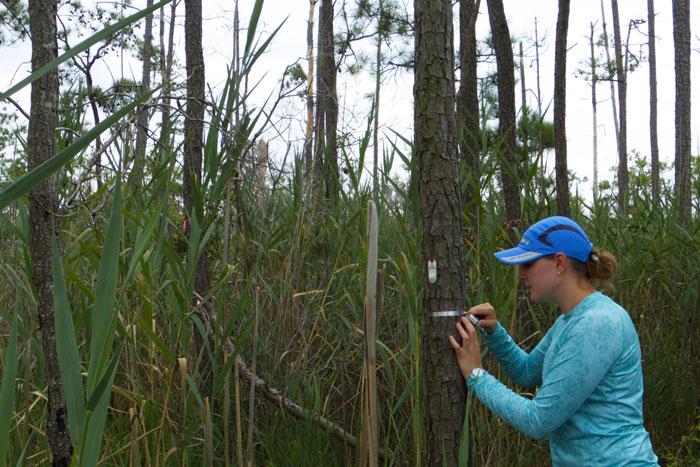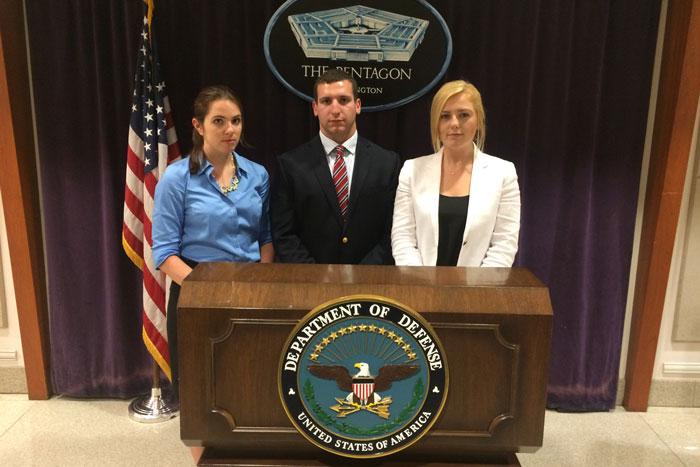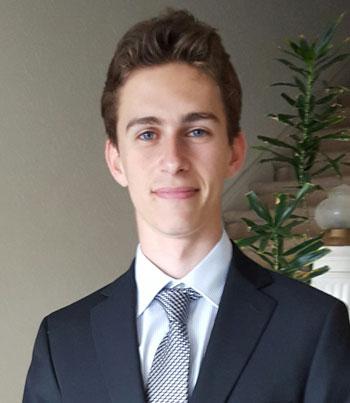Different Drumbeats

Caroline Kanaskie '17 takes tree-growth measurements for SERC's Sea Level Rise project. Photo courtesy of Maria Sharova, SERC.
From Chesapeake Bay parasites to the workings of Homeland Security to broker-dealer regulatory practices, students interning in the government/law realm this summer found that professional settings are as different as the people they meet in them. Here they share what they experienced this summer and what they’re taking away from it all.
Caroline Kanaskie ’17 – Smithsonian Environmental Research Center
Major: Environmental Science
Can you describe what you did on a day-to-day basis?
No two days at the Smithsonian Environmental Research Center (SERC) are the same. I’m working closely with a nestbox monitoring project and analyzing data collected for patterns in bird populations. I’ve been gaining a whole new skill set thanks to my participation in archaeological digs—our digs help us learn about how humans interacted with the land and how change has affected the landscape. I’ve also worked with the Chesapeake Bay Parasite Project and helped to measure and document tree growth for our Sea Level Rise project on the Eastern Shore of Maryland. Other times, I’m teaching in the classroom or creating website content.
What was the most valuable part of this internship experience for you?
I’m from Pennsylvania, so many of the environmental issues that I see in my hometown are similar to what we see in Carlisle and the surrounding areas. This internship has really opened my eyes to the issues surrounding the Chesapeake Bay. I also love the people I work with. The interns here have been so supportive, and we learn so much from each other every day, whether we’re talking about school, our hometowns or work.
How has your internship better prepared you for life after Dickinson?
Being surrounded by so many different environmental-science researchers and professionals has showed me that there are many paths into the field and so many kinds of work that can be done once you’re there. I think there’s a lot of pressure on students to find that perfect career or the right academic track. But if you love what you are studying or the job that you do, that’s what matters most.
What advice would you offer to others considering an internship?
Apply, apply, apply! Most applications are released in January, so do your homework over winter break. Getting it done early also gives your professors ample time to write letters of recommendation for you. The Career Center has awesome workshops to help with your resume, whether you are creating one for the first time or are looking to edit an existing one. Once your apps are in, be patient. Don’t let rejection get you down—the right opportunity will present itself to you.

Everything is serious when you're in the Pentagon. From left: Meghan Reynolds '16, and Sarah Cole '17 all interned. at the Department of Homeland Security this summer.
Sarah Cole ’17 – Department of Homeland Security, Office of Intergovernmental Affairs
Major: Political Science and Policy Management
How did you get your internship?
On Dickinson Connect, the Career Center database, I saw the opening for the Office of Intergovernmental Affairs (OIA) in Washington, D.C., and I thought it would be a great experience. Alaina Clark ’05, who posted the position, is the assistant deputy secretary for intergovernmental affairs and a fellow field hockey player.
Can you describe what you did for the internship on a day-to-day basis?
Homeland Security has 27 components, such as the Coast Guard, Customs and Border Protection and the Federal Emergency Management Agency. Each component sent me information every Monday regarding what their office was doing for that week; I then compiled the information into one document, our "Drumbeat." Then on Wednesdays we have a phone conference and go over the information in the Drumbeat and make sure that everyone is up-to-date with what each component is doing. I also helped run our “If You See Something, Say Something” campaign, which works to fight suspicious activity, specifically regarding domestic terrorism.
What advice would you offer to others considering an internship?
The one piece of advice that was never given to me that I want everyone to know: You will survive if you have an unpaid internship. When beginning your internship search, you should look for an environment that you are interested in and want to know more about.
What are your plans after you graduate from Dickinson?
I hope to attend law school and become a human-rights lawyer. At DHS, I learned about the vast human trafficking in the United States, and I would love to use that education in my work at the DEA or FBI.
Steven Kaplan ’17 – Bracewell & Giuliani

Major: Economics and Law & Policy
How did you get your internship?
I got it through a friend who went to Dickinson, Julian Rainero ’94.
Can you describe what you did for the internship on a day-to-day basis?
I assisted attorneys in the law firm’s broker-dealer regulatory practice. I researched regulatory authorities, rules and policies and wrote memos to other attorneys outlining my findings.
What was the most valuable part of this internship experience for you?
I’ve gained a lot of knowledge in relation to regulatory law and more work experience, and it’s increased my desire to attend law school.
What advice would you offer to others considering an internship?
Search and apply early, and see if any of your friends or connections can help. Don’t disregard unpaid internships, because they still look great on a resume and you can learn a lot.
What are your plans after you graduate from Dickinson?
I plan to either go to law school to become a lawyer or go to business school and get an MBA with a focus on finance.
Learn more
- Interns In Action
- "Lab, Field or Office?"
- "Entertainment Value"
- "A Bevy of Networks"
- "Nailed It: 5 Ways to Finish Your Internship Strong" (Huff Post)
- "Spreading the Word"
- Latest News
Published September 1, 2015